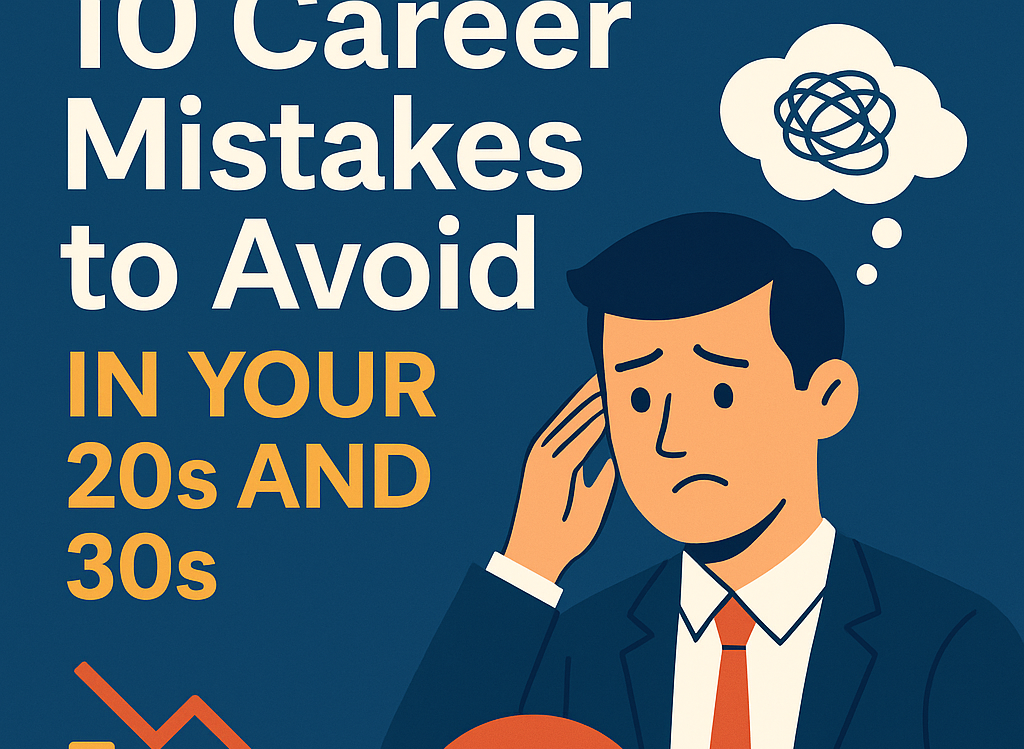10 Career Mistakes to Avoid in Your 20s and 30s

Your 20s and 30s are some of the most crucial years of your career journey. These are the decades where most professionals lay the foundation for their long-term success, financial stability, and personal fulfillment. But this is also the time where missteps can cause long-term damage or delay growth.
The good news? Most career mistakes are preventable if you know what to look out for. In this blog, we’ll walk you through 10 of the most common (and costly) career mistakes people make in their 20s and 30s—and how to avoid them.
1. Chasing Money Over Growth
It’s tempting to accept the highest-paying offer early in your career. But choosing a job purely based on salary can backfire if it doesn't offer learning opportunities, mentorship, or career progression.
What to Do Instead: Focus on roles that offer long-term growth, learning, and mentorship. In the early years, skills and network > paycheck.
Example Resource: Harvard Business Review: Don’t Make These 7 Common Career Mistakes
2. Not Building a Professional Network
Many people in their 20s underestimate the power of networking. They think it’s something you do only when job hunting. But in reality, your network often determines your net worth.
What to Do Instead: Attend industry events, connect with peers and mentors on LinkedIn, and don’t be afraid to reach out to people in your desired roles.
Tool: Lunchclub - An AI-powered tool for professional networking.
3. Sticking Too Long in a Comfort Zone
Stability feels safe, but growth often lives outside your comfort zone. Staying in the same role for too long can lead to stagnation.
What to Do Instead: Set a 12- to 18-month growth plan. If you’re no longer learning or being challenged, it’s time to pivot, upskill, or explore new roles.
4. Not Negotiating Salary or Benefits
Many early-career professionals accept the first offer they're given. But failing to negotiate can lead to a cumulative loss of tens of thousands of dollars over your lifetime.
What to Do Instead: Research salary benchmarks on Glassdoor, Payscale, and Levels.fyi. Practice negotiation scripts with a friend or coach.
5. Ignoring Financial Planning
It’s easy to postpone thinking about saving or investing when your paycheck just started arriving. But this is the best time to build smart financial habits.
What to Do Instead: Start budgeting, saving for emergencies, and investing in retirement accounts (like 401k, Roth IRA). Use tools like YNAB or Mint.
6. Not Asking for Feedback
If you’re not asking how you can improve, you’re likely missing out on key growth opportunities. Feedback is one of the fastest ways to level up.
What to Do Instead: Schedule quarterly check-ins with your manager. Ask specific questions like, "What can I do more of?" or "What should I stop doing?"
7. Comparing Your Journey to Others
Scrolling through LinkedIn success stories can make you feel behind. But comparing your journey to others is a distraction and often inaccurate.
What to Do Instead: Focus on your own progress. Set personal KPIs (e.g., new skills learned, responsibilities handled) instead of comparing salaries or job titles.
Reminder: People usually only post highlights online, not the setbacks.
8. Not Investing in Soft Skills
You can be technically brilliant but struggle to move ahead without strong communication, emotional intelligence, and leadership skills.
What to Do Instead: Take courses on communication, negotiation, and leadership. Platforms like Coursera, LinkedIn Learning, and Udemy offer affordable options.
9. Ignoring Mental Health and Work-Life Balance
The hustle culture glorifies overworking. But burnout is real and can severely derail your career.
What to Do Instead: Set boundaries. Take time off. Invest in your mental and physical health. Remember, a sustainable career is a marathon, not a sprint.
Resource: Mind - A mental health charity offering tools and support.
10. Not Having a Long-Term Vision
Drifting from one job to another without a bigger picture in mind can lead to regret or missed potential.
What to Do Instead: Create a flexible 5- or 10-year plan. Think about the kind of life you want, not just the title. Revisit and adjust it yearly.
Tool: Use a free planner like Notion to map out your career and life goals.
Case Study: Daniel’s Journey
Daniel, a 25-year-old marketing assistant in the UK, took the first job he could get after university. It paid well, but he felt unchallenged and disconnected. He stayed in that role for three years without learning much or networking. At 28, he realized he’d plateaued.
After speaking with a mentor, Daniel decided to invest in himself. He began attending digital marketing workshops, took an SEO certification from HubSpot Academy, and reached out to marketing professionals on LinkedIn. Within a year, he transitioned to a digital strategist role at a fast-growing startup.
Key Lessons from Daniel:
- Don’t wait until you're unhappy to grow.
- Seek feedback and mentorship early.
- Always align your work with what energizes you.
Your 20s and 30s are powerful years—but only if you use them wisely. Avoiding these 10 mistakes doesn’t guarantee instant success, but it sets the stage for long-term achievement and fulfillment.
Start today by reviewing where you are, where you want to go, and what habits or changes will help get you there. Remember, it’s never too late to make a smarter move.
More Resources from UJ+:
- How to Choose the Right Career Path When You’re Unsure
- Resume Mistakes You Might Be Making Right Now
- Best Career Planning Tools for Beginners
Stay tuned for more actionable guides, real-world insights, and smarter career tips at UJ+ (USA Jobs Plus)!

